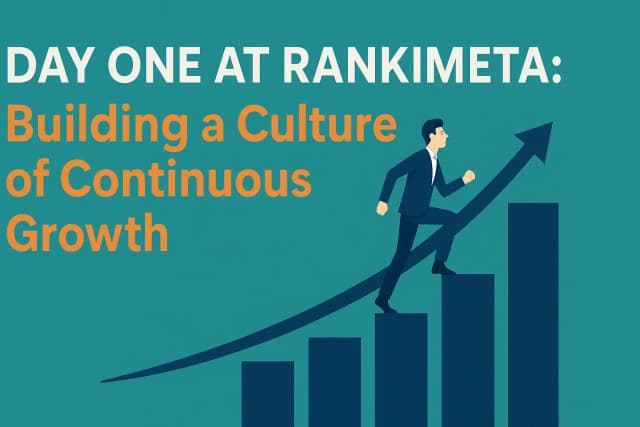- Blog
- Blog detail

Digital marketing is rapidly growing. Today’s audiences are engaged online, shifting from traditional media. Online reports say that the global digital advertising market size is estimated to reach $786.2 billion by 2026. This exhibits a compound annual growth rate (CAGR) of 9% from 2020 to 2026. It becomes essential for startups, enterprises, and B2B brands to attract these online audiences through digital marketing.
Here’s a small guide on digital marketing in 2025.
What is Digital Marketing?
Digital marketing refers to the technique of promoting a company’s products or services through digital platforms, e.g., social media, search engines, email, websites, and mobile apps. Digital marketing aims to sell its products or services to potential customers through the platforms where customers spend most of their time.
It’s History
Digital marketing, also known as online advertising, began in the early 1990s with the introduction of the Archie (search engine). It’s the first search engine in history that laid the foundation for contemporary marketing.
Platforms like Yahoo and Google commercialized digital advertising, with Google launching AdWords in 2000, transforming how businesses reached users online through keyword targeting. This led to customers starting to search for products online.
Traditional vs. Digital Marketing
While digital marketing and traditional marketing share similar principles and techniques, they differ significantly in the channels used to reach audiences.
Traditional marketing refers to the conventional methods of promoting products or services that rely on offline channels, such as print media advertising, broadcast media like TV and radio, direct mail, and outdoor advertising. On the other hand, digital marketing refers to the modern method of marketing through online channels.
Digital marketing is an internet-based marketing strategy through search engine optimization (SEO), social media marketing (SMM), email marketing, pay-per-click (PPC), content marketing, and affiliate marketing. Unlike traditional marketing, digital marketing is constantly evolving due to constant technological expansion. Their marketing strategies are non-linear (two-way), whereas marketing traditionally is linear (one-way).
Moreover, digital marketing is in demand today due to the increased number of internet users and online shoppers. Nowadays, people can buy products online, which cuts short the transportation and other related expenses when visiting a physical store.
B2B vs. B2C Digital Marketing
Digital marketing channels for B2B and B2C remain the same. But understanding the difference in marketing is crucial for both B2B and B2C businesses.
While the B2B business sales cycle is complex and involves multiple stakeholders, the B2C marketing journey is linear and takes fewer transactions. B2B businesses must make it obvious how their goods or services help their clients, but B2C is only based on emotional impulses. Additionally, B2B companies must build personal, strategic relationships with their customers.
B2B may employ Account-Based Marketing (ABM), which includes outreach, presentations, lead generation, targeted advertising, content marketing, and event marketing. Whereas influencer marketing, email marketing, and social media marketing work well for B2C.
In the bottom line, B2B businesses should give top priority to strategies that generate qualified leads, offer consistent responses across the sales funnel, and provide committed support. Whereas, B2C strategies should focus on attracting active customers, promoting speedy purchases, and providing effective customer support.
What Are the Key Components of Digital Marketing?
One of the foundations of digital marketing is brand awareness. It’s under this degree that consumers can remember or identify a brand in a variety of contexts.
For example, the ‘Just Do It’ tagline has become synonymous with Nike, inspiring athletes and fitness enthusiasts worldwide. It’s a prime example of a memorable tagline contributing to brand awareness.
Brand awareness should remain consistent across platforms. It should also target individual audiences rather than a broad, cohesive audience like traditional marketing does. It’s a tactical approach to grab the attention of the right audience, user interaction, and to understand their behavior in decision-making.
The key components or the tactics used in digital marketing include,
- Social media marketing: Social media marketing involves constant connection, content production, and customer engagement through social media channels like Instagram, Facebook, X (formerly Twitter), LinkedIn, Snapchat, etc. It is through this marketing that 70% of the brand awareness is created. Moreover, social media marketing offers real-time monitoring, administration, and enables plan modifications in response to criticism.
- Search engine optimization (SEO): Business websites and brand-related material can be made more visible for popular industry-related search queries by using SEO strategies. The expanding impact of search results and search features like knowledge panels, local SEO, and highlighted snippets on consumer behavior is seen to be related to the significance of SEO in raising brand awareness.
- Search engine marketing (SEM): SEM is also known as pay-per-click (PPC) or paid advertising. It includes purchasing advertising space in noticeable, high-profile locations on websites and search results pages. It is demonstrated that search advertising improves conversions, brand awareness, and recognition.
- Content Marketing: Using written, visual, or video information to reach potential customers is the aim of content marketing. Typically, such information is posted on a website and then advertised using email marketing, social media, SEO, or even pay-per-click advertising. Unlike advertising, content marketing aims to be more understated, and the sponsor's product or service may or may not be prominently featured.
- Email marketing: While some treat marketing emails as spam, it remains one of the most successful digital marketing platforms. To get names for their email lists, many digital marketers utilize their other digital marketing channels. They then attempt to convert those leads into customers through email marketing.
- Website marketing: Businesses frequently use their website as the focal point of their online marketing campaigns. The most successful websites provide a clear and memorable representation of their brand.
- Affiliate marketing: Affiliate marketing, now amplified by the internet, is one of the earliest types of marketing. Businesses and individual "influencers" that promote the goods of another brand in affiliate marketing receive a commission each time a sale is made or a new lead is added to their list. Affiliate programs at several well-known companies pay out millions of dollars to affiliates who help sell their products.
Why Digital Marketing Matters Today?
Digital marketing is now a must, regardless of whether you're a startup, an enterprise, or a B2B brand offering specialized solutions. Your audience is scrolling, searching, and clicking online in today's hyperconnected world rather than merely flipping through magazines or watching TV commercials.
Cost-effectiveness is one of its main benefits. With smaller budgets, digital campaigns can result in a greater ROI than traditional marketing. Unlike billboards or print advertisements, you can test, measure, and optimize in real-time.
Personalized customer experiences at scale are also made possible by digital marketing. Brands can send customized emails or retarget website visitors to get the right message to the right person at the right time.
Above all, it maintains your competitiveness. Today's consumers do extensive research before making a purchase, particularly in B2B transactions. You're already behind if your brand doesn't appear online with credible, high-quality content.
To Sum It Up
Digital marketing tactics are not all made equal. On platforms like Instagram or YouTube, a B2C campaign may emphasize visually appealing content, emotion-driven storytelling, and impulsive purchases. B2B marketing, on the other hand, is typically more data-driven and places an emphasis on establishing long-term connections, producing informative content, and establishing authority through case studies, SEO blogs, and LinkedIn.
At Rankinmeta, this is where our competitive advantage resides. Whether you are a B2B seeking to generate qualified leads or a B2C seeking to increase engagement, we create customized digital strategies that fit the mindset and journey of your target audience.
We produce results that count, from thorough audience research and goal-setting to campaign execution on email, social media, content marketing, and SEO.


